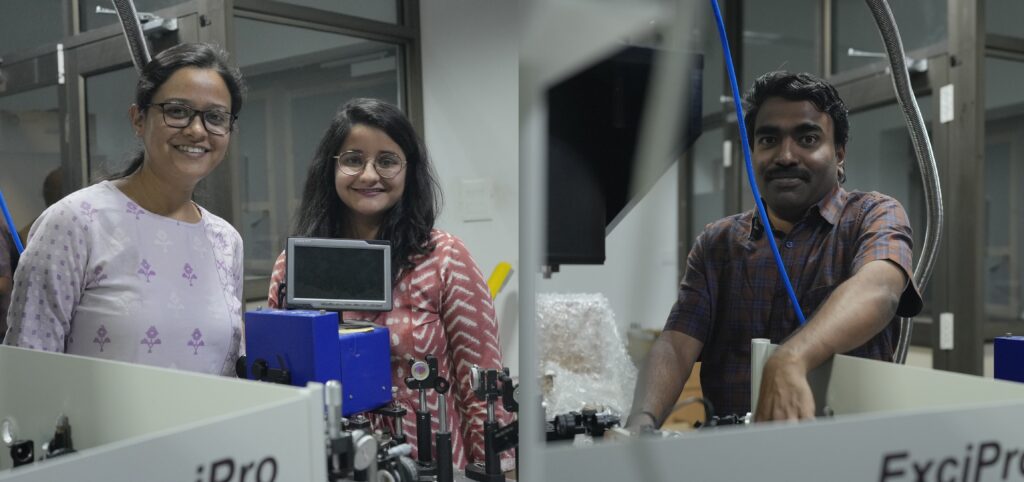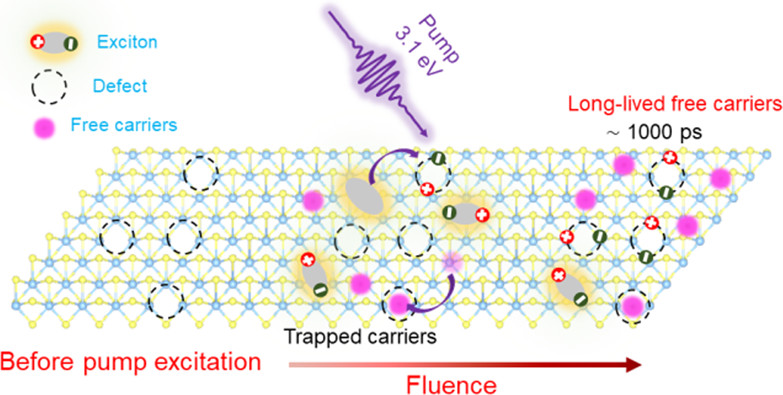- Home
- IISER Bhopal researchers study the nature of light-generated charge carriers in Transition Metal Dichalcogenides
IISER Bhopal researchers study the nature of light-generated charge carriers in Transition Metal Dichalcogenides

by Prashant Kapadia/NHN
The research will help in the development of advanced optoelectronic devices such as phototransistors, light detectors, light-emitting diodes (LEDs) and solar cells.
Bhopal, 11th April 2023: Indian Institute of Science Education and Research Bhopal researchers explore the properties of transition metal dichalcogenides (TMDs), a class of advanced two-dimensional materials with unique electrical, optical, and mechanical properties.
The research on one kind of TMDs – Molybdenum Disulphide (MoS2) nanosheets, could pave the way for the development of advanced optoelectronic devices such as phototransistors, light detectors, light-emitting diodes (LEDs) and solar cells. The findings of this research have recently been published in the Journal of The Journal of Physical Chemistry C, and Surface and Interface Analysis. The research is led by Dr. K. V. Adarsh, Professor, Department of Physics, IISER Bhopal, and his research scholars Ms. Pravrati Taank, Ms. Riyanka Karmakar, who contributed equally to this work.
TMDs such as MoS2 nanosheets are semiconducting 2D layered materials, and their thickness-dependent band gap makes them a potential material for optoelectronic devices. Previous research has reported the existence of free carriers and excitons, which are particles produced when an electron is excited by light. These carriers play a vital role in electronic and optoelectronic applications. Scientists have conducted several studies to understand how these carriers behave when generated by light. These studies have shown that various factors, such as defects, free carriers, lattice heating, and sample processing, can affect carrier dynamics. However, distinguishing between them has been challenging.
Dr. K.V. Adarsh and his PhD students, Ms. Pravrati Taank, Ms. Riyanka Karmakar, Dr. Rituraj Sharma, Dr. Rajesh Kumar Yadav, Dr. Megha Shrivastava, and Mr. Naresh Chandra Maurya and other co-authors Dr. Debjani Karmakar from BARC, Mumbai used an advanced technique called femtosecond transient absorption spectroscopy to study how light interacts with few-layer MoS2 nanosheets. Their work found clear evidence of two types of charge particles – excitons and free carriers, that behave differently based on the amount of energy used to excite them.
The researchers found that high-energy light produces excitons and free carriers, but the excitons disappeared quickly due to defects. Free carriers, on the other hand, lingered for up to a nanosecond (a hundred thousandth of a second). Low-energy light only produced excitons, which disappeared quickly.
“Our systematic studies in few-layer MoS2 nanosheets reveal crucial information on the unexplored domain of excitons and free carriers’ recombination in the presence of defects for several optoelectronic applications,” said Dr. K.V. Adarsh, IISER Bhopal.
The scientists have also examined the characteristics of defects and studied various configuration of sulphur vacancies using density functional theory (DFT) and time-dependent DFT.
ABOUT IISER BHOPAL : Established by the Ministry of Education (then Ministry of Human Resource & Development), Government of India, in 2008, IISER Bhopal is the youngest of the first five IISERs. In a decade, the Institute has received several distinctions, duly carving out its own position in the national and international arena.
With a vision to provide high quality education to the students and contribute to society through its research, IISER Bhopal is the first IISER to have been declared by the Ministry of Education for project completion.
IISER Bhopal is continuously consolidating its position in the National and International rankings and has secured 61st place in The National Institutional Ranking Framework, Ministry of Education, Government of India. Along with this, IISER Bhopal has gained rank 281-290 in the overall category of the QS Asia Ranking 2023. The Institute has also been ranked 57th (National Rank, out of 70 in the 1500 Institutes) in the Times Higher Education 2023 World Ranking.

